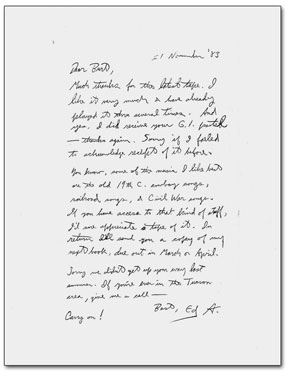
Remembering Ed
“If it’s knowledge and wisdom you want, then seek out the company of those who do real work for an honest purpose.” – Edward Abbey
The other day, I was rummaging through some files in my studio and came across some letters and cards that my old friend Ed Abbey had sent me. I first became a friend of Ed’s shortly after the publication of his novel Desert Solitaire. I still consider it one of his best works. We corresponded frequently from 1982-83. Sifting through some articles and notes, I realized that his birthday was coming up on Jan. 29. It would be right in the middle of “Snowdown,” Durango’s mid-winter festival. Ed would have loved it. Unfortunately, Ed left us in March of 1989, succumbing to esophageal cancer. It seemed like just yesterday that we debated environmental issues over a few beers at the El Rancho.
I remember that on one occasion we talked during a book signing at Maria’s. It must have been in the late ’80s. I chuckled when he took me aside and whispered in my ear, “You know, Burt ... everybody in here wants some damn advice about writing!” He rolled his eyes and smiled. I told him I had to head off to a Rec League playoff game and that we would meet later for a drink. I played for Elmore’s Store back in those days. That quaint and popular landmark with motel had vanished just a few years after Ed.
 Shortly after his passing, an editorial appeared in the Durango Herald declaring that Ed’s philosophy was a failed one. To focus on the negative shortly after one’s death I found utterly in poor taste. So I sent a letter chiding the editor, for it seemed apparent to me that he had read very little of Abbey’s works or misinterpreted them at best.
Shortly after his passing, an editorial appeared in the Durango Herald declaring that Ed’s philosophy was a failed one. To focus on the negative shortly after one’s death I found utterly in poor taste. So I sent a letter chiding the editor, for it seemed apparent to me that he had read very little of Abbey’s works or misinterpreted them at best.
Ed was a curmudgeon, a gadfly, an autobiographer and foremost a writer of fiction. He gained notoriety with his book, The Monkey Wrench Gang. This fictional piece was a scathing attack on land development and environmental destruction by the powers that be.
Furthermore, Abbey was a man who tackled a number of societal issues. He wanted to awaken individuals to the plight of wilderness destruction. He was an activist and yes, at times, his writings and ideas were outlandish, capricious and sardonic; yet they awakened the conscience and made the reader think about what was really going on behind the scenes. Those individuals who consider his writings a manifesto for radical political action concerning the environment are not all “beer drinking hoodlums,” as that editorial described. Those individuals who consider vandalism and destruction of property as a way to express their politics must be held accountable for their actions. No one is immune to the law. Literature is a powerful tool, and it can lead people to extreme measures such as violence. This was quite evident over the furor by radical muslims after the publication of Salman Rushdie’s The Satanic Verses. I believe that an author should not be held accountable for unintelligent readers and individuals who wish to use literature out of context for divisive actions.
Ed and I were just developing our friendship in the mid-’80s. We exchanged ideas about music, art, the environment, politics and social issues of the day. Ed was a veteran. He was an intelligent, argumentative, stubborn and yet focused individual who really cared about the preservation of wild lands. We disagreed on a number of issues, and that was OK. His anarchistic ideas, frustrations and anger were exorcised passionately in his writings. Writing was his vehicle to vent and yet inform.
Abbey would say some of the most outlandish things just to get someone’s dander up. Yet, in retrospect, I think that there was always an element of truth in those outlandish barbs. I believe that Ed Abbey was true to the tradition of American visionary activism that included the works of such individuals as Henry David Thoreau, Elizabeth Stanton, Walt Whitman, Joe Hill and Woody Guthrie. To have a vision, to fight injustice and to express your ideas openly always creates controversy. It is part of American tradition. Ed offered readers platforms for growing their ideas and developing insights. Those that misconceptualized his art are at the whim of their own ignorance. Happy birthday, Ed. I’ll raise my glass to you come Snowdown!
– Burt Baldwin
In this week's issue...
- December 18, 2025
- Let it snow
Although ski areas across the West have taken a hit, there’s still hope
- December 18, 2025
- Look, but don't take
Lessons in pottery theft – and remorse – from SW Colorado
- December 11, 2025
- Big plans
Whole Foods, 270 apartments could be coming to Durango Mall parcel
